thanks Melody, for passing this on.
Sista Solidarity
May 9, 2011
Where everything is music – by Rumi
Posted by openbracket under Roaming solidarity, Sista SolidarityLeave a Comment
thanks Melody, for passing this on.
May 6, 2011
EU Ban on Traditional Herbal Medicine Products
Posted by openbracket under Body solidarity, Roaming solidarity, Sista Solidarity, Solidarity in Lambeth[14] Comments
Invisible Food is a skill share. We operate without an expert to increase our skills, resilience and self-reliance. We act safely, responsibly, exercising common sense, self-help, and helping each other with respect and tolerance.
With the complexity of the EU Ban on Traditional Herbal Medicinal Products, I wanted to get someone to come and talk to us to get us up to speed on a complex legal issue. I haven’t found that person yet so in the meantime, and with the above in mind, let’s work with our questions and concerns to raise our awareness ourselves and prick up our critical antennae.
As an exercise, write down your questions surrounding the following statements. Please get in touch with your questions and concerns. We are planning a project to increase the number of medicinal herbs available to us. Contact us if you are interested in participating!
The EU directive, called the THMPD (Traditional Herbal Medicinal Products Directive) seeks to not just ban the use of herbal remedies but to actually criminalize them — making the growing or keeping of herbs for use in teas just as illegal as those for less conventional use. Does this mean keeping herbs in your garden for personal use would be illegal?
What else do you want to know about this?
The use of traditional and herbal remedies has already been banned in Canada.
What else do you want to know about this?
“Herbal remedies are used throughout the world and have been in use since the beginning of history. This is what the witchhunts were about. How many women were killed during the witchhunt? Power is trying to obliterate our connection with the earth.”
What else do you want to know about this?
The Alliance for Natural Health (ANH) is at the forefront of a massive effort to stop what they deem ‘this unprecedented attack’ on the rights of patients. The ANH is taking legal action against this directive, with the assistance of the European Benefyt Foundation (EBF).
Between them they have already managed to raise 90,000 pounds to fight the court case, but they’re requesting your help, too. Because, they say, if people don’t cry out in protest, it will be seen as agreement of the ban, or as lack of interest, which is why a citizens action group has been formed and has been circulating a petition to counter the THMPD Directive.
What else do you want to know about this?
The EU Directive erects high barriers to any herbal remedy that hasn’t been on the market for 30 years — including virtually all Chinese, Ayurvedic, and African traditional medicine. It’s a draconian move that helps drug companies and ignores thousands of years of medical knowledge.
It’s hard to believe, but if a child is sick, and there is a safe and natural herbal remedy for that illness, it may be impossible to find that remedy.
What else do you want to know about this?
The EU directive, called the THMPD (Traditional Herbal Medicinal Products Directive) will create major barriers to manufactured herbal remedies, requiring enormous costs,and years of effort. Each herb will cost around £80,000 to register. Pharmaceutical companies have the resources to jump through these hoops but hundreds of small- and medium-sized herbal medicine businesses, across Europe and worldwide, will go bust.
What else do you want to know about this?
There are arguments for better regulation of natural medicine, but this draconian directive harms the ability of Europeans to make safe and healthy choices. Let’s stand up for our health, and our right to choose safe herbal medicine.
Dr. Robert Verkerk, executive and scientific director of the UK-based Alliance for Natural Health (ANH) – an NGO promoting natural remedies – said: “At the end of April we plan to challenge the directive first of all in the High Court in London, on the grounds that it is disproportionate, non-transparent and discriminatory. We then hope to have the case referred to the European Court of Justice in Luxembourg.”
What else do you want to know about this?
Dr. Robert Verkerk, executive and scientific director of the UK-based Alliance for Natural Health (ANH) – an NGO promoting natural remedies – said: countries such as the Czech Republic and the Netherlands were adopting a liberal approach to implementation which meant that many herbal remedies could be construed as ordinary foodstuffs and thus escape regulation. Think about garlic capsules. This could be seen as foodstuff.
He added that other states, notably the UK and Belgium, were approaching the directive more vigorously, outlawing many more unregistered herbal remedies.
What else do you want to know about this?
The EU Directive erects high barriers to any herbal remedy that hasn’t been on the market for 30 years — including virtually all Chinese, Ayurvedic, and African traditional medicine. It’s a draconian move that helps drug companies and ignores thousands of years of medical knowledge.
What else do you want to know about this?
Examples of remedies threatened following the expiry of the deadline include traditional European herbal cures using hawthorn and meadowsweet in addition to a swathe of herbs used in traditional Indian Ayurvedic, Chinese and Amazonian remedies.
Dr Robert Verkerk said: “The problem is that [synthetic chemical ingredients] are deemed necessary by formulators in order to meet the pharmaceutical stability standards set by the EU directive. Forcing non-European herbal traditions into a European straitjacket would effectively corrupt these great traditions.”
If the ban is allowed to take effect, the ANH says it will effectively eliminate access to phytotherapy, herbalism and all of the traditional plant-based remedies of Indian, Amazonian, African and Chinese cultures. In a very real sense, then, this could also be seen a a cultural attack on specific ethnic groups and ways of life.
What else do you want to know about this?
“A new, more appropriate and affordable system of quality control is urgently required to prevent discrimination against the long-standing traditions, and this is something we aim to push for through our planned judicial review,” Verkerk said.
On the other hand, proponents of the ban claim they are attempting to protect the naive from shoddily produced ‘snake-oil’ elixirs and medicines. They claim that herbal remedies will still be available but that they will simply be safer.
What else do you want to know about this?
In France a petition against the directive has been launched by a group of natural remedy stakeholders calling itself ‘Le Collectif pour la Défense de la Médecine Naturelle’. It states the directive imposes a disproportionately costly administrative burden on numerous natural remedies which have existed in Europe for centuries and are not dangerous. A spokesperson for Le Collectif pour la Défense de la Médecine Naturelle said: “If charlatans exist within the sector, that does not justify the persecution of those who rely on numerous producers of plant-based alternative therapies. This type of vigilance will only benefit those who are able to verify that their medicaments are manufactured using certain petrochemical compounds, from which the side effects are incontestably worse.”
What else do you want to know about this?
” This is not just about herbal medicine. Big corporations are gaining control over every aspect of our lives, from the food we eat, to the electricity we need in our homes, to our leisure activities and the way we communicate with our fellow human beings.”
What else do you want to know about this?
This following article deals specifically with the situation for Chinese herbalists.
Traditional Chinese medicine firms may face delisting in EU market
http://english.peopledaily.com.cn/90001/90776/90883/7343301.html
The European Union released the “Registration Process Order of Traditional Herbal Medicine” in March 2004 and required enterprises that want to remain in the E.U. market to meet registration standards by March 31, 2011. This order has set a “seven-year limit” for herbal medicine that was imported in the name of food, health care products and even agricultural and sideline native products.
Unfortunately, no Chinese enterprise has completed the registration before the deadline. This also indicates that after missing the seven-year transitional period, traditional Chinese medicine may face the risk of delisting in the E.U. market.
Why did domestic traditional Chinese medicine producers give up the opportunity to apply for the access to the European market? Guo Guiqin, deputy general manager of China Beijing Tongrentang Group Company, said that the main reason is that the registration application fees, particularly the intermediary fees, are too high to afford.
Furthermore, an application standard stipulates that related herbal drug products must already be in medicinal use in the European Union for a period of 15 years preceding the date of the application.
Although traditional Chinese medicine products entered into the E.U. market as early as 1995, domestic traditional Chinese medicine producers regrettably lacked the sense of self-protection and neglected to keep product sales records. Even domestic time-honored producers such as Tongrentang cannot provide evidence to prove that their products have been available on the markets of E.U. members for 15 years.
Although traditional Chinese medicine is very popular in Southeast Asia, traditional Chinese medicine products have often been locked outside of other overseas markets, such as the European Union. It is still possible for traditional Chinese medicine producers to export products to the European Union in the future.
In the long run, however, China’s traditional Chinese medicine industry must follow international practice in terms of product production, processing and distribution to really expand the international market.
March 12, 2011
Local Interfaith Initiative for the Environment – retreat in Kent
Posted by openbracket under Body solidarity, Island solidarity, Roaming solidarity, Sista Solidarity, Solidarity in LambethLeave a Comment
November 5, 2009
October 17th Hawthorns and Sloes
Posted by openbracket under Body solidarity, Roaming solidarity, Sista Solidarity, Solidarity in Lambeth[2] Comments
Preparation for the walk started the night before, when Solomon and I made bread to accompany the jam.

Kneading the dough quite late at night
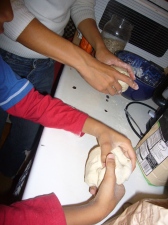
Hands hard at work
We had another massive turnout on Saturday 17th October. We started off thinking about how we prepare for winter, from buying some thermals to doing preserves of jam and chutneys. We walked from Wyck Gardens over to Ruskin Park and stayed in the Northway Road entrance area. I’ve been scouring the park for Sloes but I haven’t found any. I’d brought some sloes with me that I’d picked near Lewes in Sussex and others on Romney Marsh in Kent. Various people tried them raw and I wish I’d taken a photo of their faces as they did. Sloes are safe to eat but they immediately dry the mouth as they are strongly astringent. The flowers are laxative (also a diuretic, good for cystitis and rheumatism) and the fruits are ‘binding’ and full of Vitamin C. The small fruits are the ancestor of the plum, measure around 9 – 15mm and have an attractive blue-black tinge and greenish flesh inside. The fruits are good for jellies and gin.
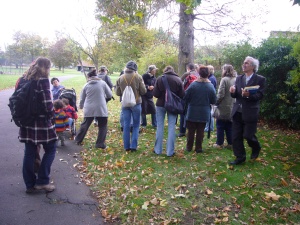
Gathering in Ruskin Park

Picking up horse chestnuts. Can't eat those though!
Horse chestnuts are apparently a good remedy for varicose veins and there’s a recipe in the Grow your own drugs book for this. Conkers are best known for their game playing potential but Conkers as a game hasn’t really made a come back. Not yet.

One for you and one for you!
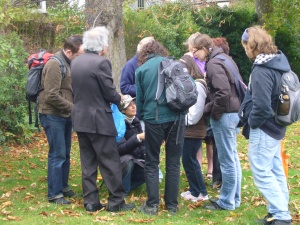
Looking at chickweed or yarrow
I haven’t got round to learning about mushrooms yet. In the meantime, here is one possible way of learning, workshops and forays around London.
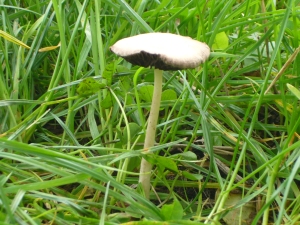
Funghi in Ruskin Park

Ancient Hawthorn trees were used as public meeting places
We looked extensively as Hawthorn. The Bright scarlet one is Midland Hawthorn and the Duller Crimson is Hawthorn. You can eat the leaves in Spring and use the spring flowers in syrups and puddings and I’ve heard it makes an excellent wine. A delicious toast for an end of year celebration. A reminder of the spring that is round the corner. An infusion of the flowers and leaves is a cardiac sedative, it dilates the blood vessels, lowers the blood pressure and I’ve even seen it in the Grow your own drugs as part of the ingredients for a cholesterol reducing tonic. I’ve also read that it is not a plant to use for self-medication. If you’ve got a heart problem, get specialist help. However, I really believe in the long term benefit from the careful and informed use of plants in your diet.
The berries, ready from August to October are good for jellies and chutney. 

Walkers taking over Northway Road!

A wild patch on the corner of Coldharbour and Loughborough. Too many cars to pick here though
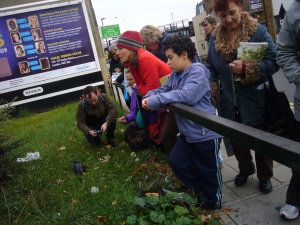
Nice bouncy bush of mallow, loads of plantain too
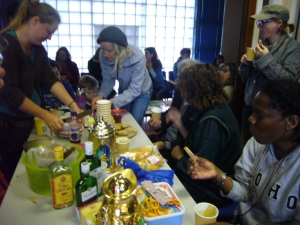
Refreshments. The bottles of gin were to make sloe gin!
We made ourselves at home in the Boardroom underneath Harper House and had refreshments including elderflower, mint and yarrow tea, lemon balm tea and dandelion root coffee. We ate the bread Solomon and I made last night with apple jelly (from crab apples on the estate). Marion brought a spelt cake, delicious with a real almond kick. We relaxed for a bit, and did some drawing.

Boys drawing plants

More drawing
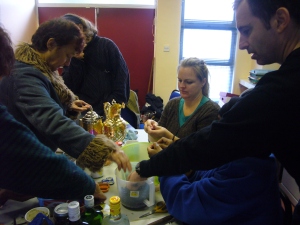
Everyone destalking the sloes
Then we started making the gin. All (washed) hands to the job! Some people brought their own sterilised bottles for decanting.

Double checking and Sorting through the sloes

Pricking the sloes so the juices run ...

Sterilised needles to do the job. This was a double prick technique someone devised on the day!
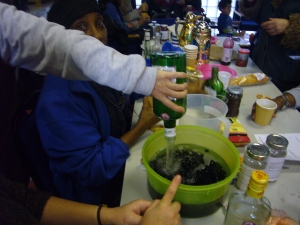
The Gin goes In
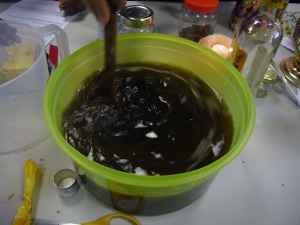
Give it a stir for good luck
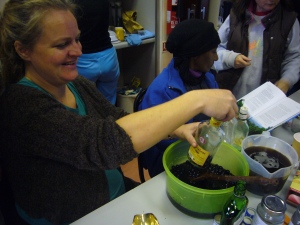
Filling up the bottles again
This is Althea who was 40 weeks pregnant, a wild food enthusiast, and gave birth to a son 3 days after the walk. Welcome to the World! We’ll toast you both with this gin, when it’s ready, at the Christmas feast
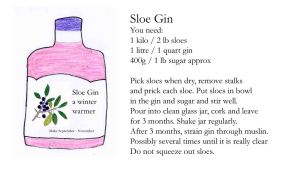
October 16, 2009
Healing properties of plants
Posted by openbracket under Body solidarity, Island solidarity, Sista Solidarity, Solidarity in Lambeth[2] Comments
These were the plants we looked at on the Mental Health day walk on 9th October.
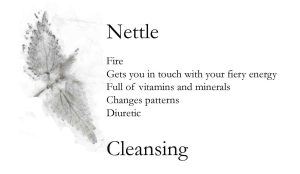
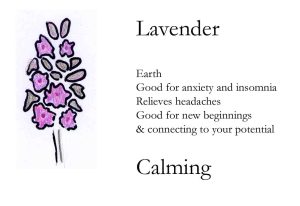
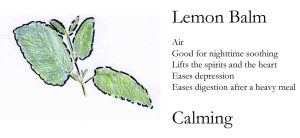
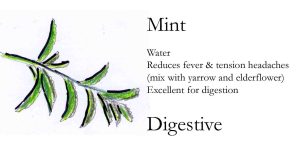



October 16, 2009
Walk and Talk on World Mental Health day October 9th
Posted by openbracket under Body solidarity, Island solidarity, Sista Solidarity, Solidarity in Lambeth[3] Comments
Today we celebrated all mental health. Walking and talking and looking especially at the emotional healing properties of plants, wild plants and cultivated herbs in the herb garden between Angell Town and Loughborough Estates.
It seemed right to have a little worksheet with everyone completing all the properties of the plants. So people had something to take away with them, a reminder of the day, some information, some supportive words. Here is a taster of the workshop and click here for all of them.
https://lambethbandofsolidarity.wordpress.com/2009/10/16/healing-properties-of-plants/
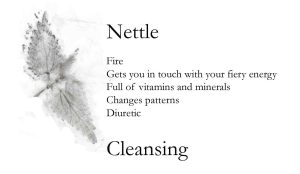
Cleansing Nettle
We spent ages in Wyck Gardens as usual, there are so many plants there. It’s wild and wonderful.

Setting off in Wyck Gardens
And we even found blackberries, plump and juicy, like the early summer ones. I couldn’t believe it. Just 3 or 4. But a nice find.
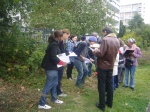
We even found blackberries that were still good for eating!
There’s a large pear tree near Edgehill house, I’ve collected windfall for here for a pie. the pears were very hard and needed a lot of stewing. But they’re large.

Trying to get pears down, near Edgehill House

Completing the herb sheet at the herb garden
We looked especially at Rosemary, Lavender, Mint, Thyme, Sage and Lemon balm.
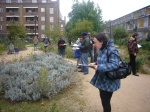
Looking for the mint!
And then we stoked up the storm kettle and had a welcome cup of tea. It was a little bit chilly.
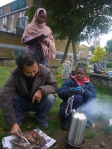
Boiling water for tea with the storm kettle
We finished with butter bean and nettle pie, with turmeric.

Eating butter bean and nettle pies
It was great to have such lovely people around, and I hope to do more midweek walks in the future.
Now go here for the plants
https://lambethbandofsolidarity.wordpress.com/2009/10/16/healing-properties-of-plants/
September 21, 2009
Loughborough Green Day September 12th
Posted by openbracket under Body solidarity, Island solidarity, Sista Solidarity, Solidarity in LambethLeave a Comment
A little bit of talking to people, sharing herb teas and browsing through the books in Woolley Gardens at the Loughborough Centre’s first green day. Friend and resident Segen volunteered to look after the stall for the day. Thank you Segen!

July 24, 2009
Planet of Swans – for London’s street women and trafficked women
Posted by openbracket under Roaming solidarity, Sista SolidarityLeave a Comment
at the Arcola Theatre, Saturday 25th July 2009
a company of women, swans, peace, eternity, preening, loving, circles of water
Water music
then the acro beasts invade “Boring! We want a a fight! Fight! Fight! Can you fight?!”
Drums
Feathers fly
War cry
The Opera Moon Song
The violin, the heart, the cygnet
An original idea and directed by Carmel Morrissey.
Performers are Carmel, Alexia, Lida, Renata, Ceri, Lauren, Ruth, Momboya, Hannah, Helen, and costumes and design by Leanne
July 24, 2009
Women Making History 2009
Posted by openbracket under Roaming solidarity, Sista Solidarity, Solidarity in Lambeth1 Comment
Women Making History:
an intergenerational conference led by London women
Saturday July 11th 2009 1.30 – 4.45pm
at the Museum of London Docklands, Quayside Room, 3rd Floor
a one day participatory conference led by London women from different communities and generations looking at what women in London have lost and gained over the past 50 years and what we need to create momentum to change
-
featuring films from the Women Making History 2008 and 2009 projects,
-
a discussion led by participants from 2008 and 2009
-
the Women’s library,
-
poetry performance from Dorothea Smartt,
-
presentation from Remembering Olive Collective,
-
badges
-
zines
For further information please contact Lynda Agard, Community Access Officer at the Museum of London lagard@museumoflondon.org.uk 020 78145775 or Ceri Buck on cezzab@yahoo.com or 07963 446605
Getting to the Museum of London Docklands
Museum of London Docklands
West India Quay, Canary Wharf
London E14 4AL
By DLR: West India Quay
By Tube: Canary Wharf
By Bus: D3, D7, D8, 277, N50, D6, 15, 115, 135
There is no entrance fee to the museum for conference participants
About the participants
Golden Oldies
The Golden Oldies is a group for elders of Caribbean origin. They’ve been meeting on the Walworth Road, South London for around 13 years. They do a variety of activities, keep fit, healthy living, African drumming, Black history month activities, and share a meal together. They often go on trips out all over London, and abroad.
Shravika Satsang Mandal
The Shravika Satsang Mandal group from the Wembley area in North West London is a collective of Asian women of East African origin who meet weekly to practice yoga, reflexology, share food and spiritual and reflective literature together. The women provide support for each other to face the day-to-day problems of settling and living in Britain. It was founded by Vilasgauri Dhanani in 1973 whose aim has always been to use a holistic approach to life and health to empower Asian women.
Young women from the Sir John Cass Foundation & Red Coats School
The above two groups have been meeting, discussing and creating work with various young women studying English and Media at the Sir John Cass Foundation & Red Coats School on Stepney Way, East London
Remembering Olive Collective
| Olive Morris was a key figure in Lambeth’s local history. She worked with the Black Panther movement; set up Brixton Black Women’s Group, was a founder member of The Organisation of Women of Asian and African Descent (OWAAD) and was central to the squatter campaigns of the 1970s. She died tragically young in 1979 at age 27.
The aim of Remembering Olive Collective (ROC) is to create public memories of Olive Morris, bringing together the personal testimonies of those who knew her, and publishing online information and materials relating to her life and work. ROC is currently working on an extensive oral history project and researching in archives and in October 2009 will be launching a public collection at Lambeth Archives focused on Olive Morris life and her times. |
www.rememberolivemorris.wordpress.com
Dorothea Smartt
Dorothea Smartt, is of Barbadian (aka Bajan) heritage. Dubbed ‘Brit-born Bajan international’ [Kamau Brathwaithe], her work receives critical attention in Britain, Europe, the Caribbean, and the USA. She is acknowledged as tackling multi-layered cultural myths and the real life experiences of Black women with searing honesty. She was Brixton Market’s first Poet-in-Residence, and a former Attached Live Artist at London’s Institute of Contemporary Arts. Her evocative and spirited voice “coils up your feelings, around granite chips of truth… unwinds solace, in the most soothing volleys” [Caribbean Times]. Described as “accessible & dynamic”, her work was recently selected to promote the best of contemporary writing in Europe today.
The Women’s Library
The Women’s Library exists to document and explore women’s lives in Britain in the past, present and future, and houses the most extensive resource for women’s history in the UK.
It was originally established in 1926, as the Library of the London Society for Women’s Service, the successor of the London women’s suffrage organisation led by Millicent Fawcett.
The current exhibition at the Library is Between the Covers: Women’s Magazines and their Readers. The reading room houses collections which cover a variety of topics, such as women’s rights, suffrage, sexuality, health, education, employment, reproductive rights, the family, and the home. The emphasis is primarily on women in Britain, but some international material is included. Entrance to the library and reading rooms is free.
The Women’s Library has collaborated with the Museum of London on the Women Making History project in 2008 and 2009.
www.londonmet.ac.uk/thewomenslibrary
October 22, 2008
AnarchaFeminist Kolektiv Open Day
Posted by openbracket under Body solidarity, Sista Solidarity, Solidarity in LambethLeave a Comment
AnarchaFeminist Kolektiv.
London AnarchaFeminist Kolektiv was formed earlier this year, after the
eviction of Wominspace, a women- and trans-only social centre in Hackney.
We are a busy group with lots of projects on the go. We have held
workshops and skillshare events on (among other things) practical
squatting/ diy skills, climbing and direct action, herbalism, have a
fortnightly reading / discussion group,have monthly women, grrls and trans
bike fixing sessions and have just finished our first zine on herbalism.
We are a women and transfolk only group.
We seek to challenge sexism and all forms of oppression and transform
society along anarchafeminist ideals.
We have lots of ideas for future actions and activities and would like to
expand our collective – are you interested in getting involved?
We would like to invite all women and transfolk to come and find out more
about the collective and help us plan what direction to take and what to
do next. We have planned a whole “creative” day to do art, silk-screen
printing, stencil and badge making, web design etc with food and an open
meeting to follow.
We will be meeting from 3pm from for creative activities, with food at six
and the open meeting at 7pm on Saturday the 25th October at Lambeth Womens
Centre, 166a Stockwell Rd, Brixton SW9.
Bring useful materials (eg cardboard, fabric for patches, screen-printing
supplies, glitter, glue, spray-paint, card, stationery, craft knives) and
vegan food to share!
Check out our website at www.lafk.wordpress.com or email us at
lafk@riseup.net for more information.